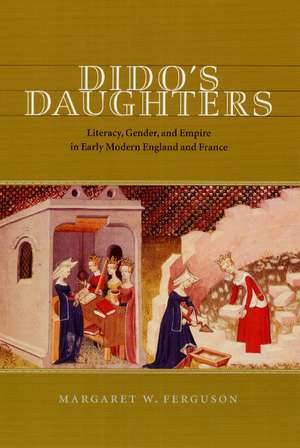Dido's Daughters: Literacy, Gender, and Empire in Early Modern England and France
Autor Margaret W. Fergusonen Limba Engleză Paperback – 3 noi 2003
Winner of the 2004 Book Award from the Society for the Study of Early Modern Women and the 2003 Roland H. Bainton Prize for Literature from the Sixteenth Century Society and Conference.
Our common definition of literacy is the ability to read and write in one language. But as Margaret Ferguson reveals in Dido's Daughters, this description is inadequate, because it fails to help us understand heated conflicts over literacy during the emergence of print culture. The fifteenth through seventeenth centuries, she shows, were a contentious era of transition from Latin and other clerical modes of literacy toward more vernacular forms of speech and writing.
Fegurson's aim in this long-awaited work is twofold: to show that what counted as more valuable among these competing literacies had much to do with notions of gender, and to demonstrate how debates about female literacy were critical to the emergence of imperial nations. Looking at writers whom she dubs the figurative daughters of the mythological figure Dido—builder of an empire that threatened to rival Rome—Ferguson traces debates about literacy and empire in the works of Marguerite de Navarre, Christine de Pizan, Elizabeth Cary, and Aphra Behn, as well as male writers such as Shakespeare, Rabelais, and Wyatt. The result is a study that sheds new light on the crucial roles that gender and women played in the modernization of England and France.
Our common definition of literacy is the ability to read and write in one language. But as Margaret Ferguson reveals in Dido's Daughters, this description is inadequate, because it fails to help us understand heated conflicts over literacy during the emergence of print culture. The fifteenth through seventeenth centuries, she shows, were a contentious era of transition from Latin and other clerical modes of literacy toward more vernacular forms of speech and writing.
Fegurson's aim in this long-awaited work is twofold: to show that what counted as more valuable among these competing literacies had much to do with notions of gender, and to demonstrate how debates about female literacy were critical to the emergence of imperial nations. Looking at writers whom she dubs the figurative daughters of the mythological figure Dido—builder of an empire that threatened to rival Rome—Ferguson traces debates about literacy and empire in the works of Marguerite de Navarre, Christine de Pizan, Elizabeth Cary, and Aphra Behn, as well as male writers such as Shakespeare, Rabelais, and Wyatt. The result is a study that sheds new light on the crucial roles that gender and women played in the modernization of England and France.
Preț: 224.61 lei
Preț vechi: 254.10 lei
-12% Nou
Puncte Express: 337
Preț estimativ în valută:
42.98€ • 44.93$ • 36.32£
42.98€ • 44.93$ • 36.32£
Carte indisponibilă temporar
Doresc să fiu notificat când acest titlu va fi disponibil:
Se trimite...
Preluare comenzi: 021 569.72.76
Specificații
ISBN-13: 9780226243122
ISBN-10: 0226243125
Pagini: 520
Ilustrații: 8 halftones
Dimensiuni: 152 x 229 x 28 mm
Greutate: 0.73 kg
Ediția:1
Editura: University of Chicago Press
Colecția University of Chicago Press
ISBN-10: 0226243125
Pagini: 520
Ilustrații: 8 halftones
Dimensiuni: 152 x 229 x 28 mm
Greutate: 0.73 kg
Ediția:1
Editura: University of Chicago Press
Colecția University of Chicago Press
Notă biografică
Margaret W. Ferguson is a professor of English and comparative literature at the University of California, Davis. She is the author of Trials of Desire: Renaissance Defenses of Poetry and coeditor of a number of books, most recently The Norton Anthology of Poetry, fourth edition.
Cuprins
List of Illustrations
Acknowledgments
Prologue
Part 1 - Theoretical and Historical Considerations
1. Competing Concepts of Literacy in Imperial Contexts: Definitions, Debates, Interpretive Models
2. Sociolinguistic Matrices for Early Modern Literacies: Paternal Latin, Mother Tongues, and Illustrious Vernaculars
3. Discourses of Imperial Nationalism as Matrices for Early Modern Literacies
Part 2 - Literacy in Action and in Fantasy Case Studies
Interlude
4. An Empire of Her Own: Literacy as Appropriation in Christine de Pizan's Livre de la Cité des Dames
5. Making the World Anew: Female Literacy as Reformation and Translation in Marguerite de Navarre's Heptaméron
6. Allegories of Imperial Subjection: Literacy as Equivocation in Elizabeth Cary's Tragedy of Mariam
7. New World Scenes from a Female Pen: Literacy as Colonization in Aphra Behn's Widdow Ranter and Oroonoko
Afterword
Notes
Select Bibliography
Index
Acknowledgments
Prologue
Part 1 - Theoretical and Historical Considerations
1. Competing Concepts of Literacy in Imperial Contexts: Definitions, Debates, Interpretive Models
2. Sociolinguistic Matrices for Early Modern Literacies: Paternal Latin, Mother Tongues, and Illustrious Vernaculars
3. Discourses of Imperial Nationalism as Matrices for Early Modern Literacies
Part 2 - Literacy in Action and in Fantasy Case Studies
Interlude
4. An Empire of Her Own: Literacy as Appropriation in Christine de Pizan's Livre de la Cité des Dames
5. Making the World Anew: Female Literacy as Reformation and Translation in Marguerite de Navarre's Heptaméron
6. Allegories of Imperial Subjection: Literacy as Equivocation in Elizabeth Cary's Tragedy of Mariam
7. New World Scenes from a Female Pen: Literacy as Colonization in Aphra Behn's Widdow Ranter and Oroonoko
Afterword
Notes
Select Bibliography
Index
